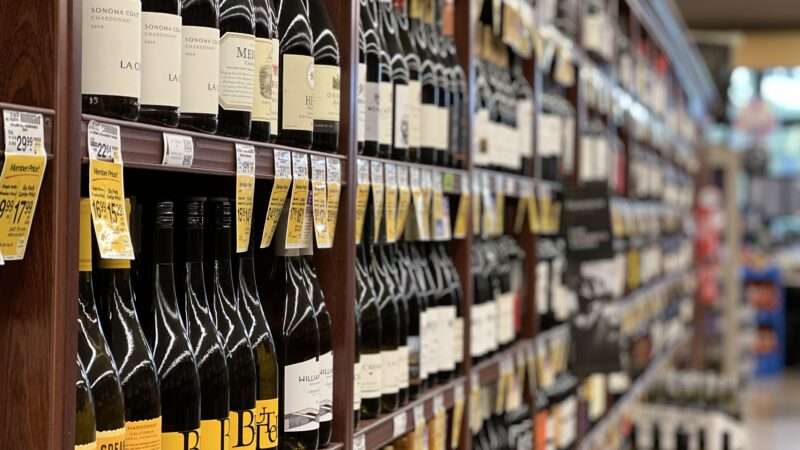
When I lived in New York City a couple of decades ago, you could buy beer in grocery stores but not wine. Although that remains true, a bill introduced by state Sen. Liz Krueger (D–Manhattan) would finally allow New Yorkers to buy wine in stores that also sell food—an option that shoppers in most states (including Texas, where I live) already take for granted.
As usual, the opposition to alcohol liberalization in New York is led by independent liquor merchants, who see competition as an existential threat. The chief backer of Krueger’s bill is Wegmans, the Rochester-based grocery chain that also played a central role in making beer more accessible in my home state of Pennsylvania.
Both of these stories illustrate how a company pursuing profit can promote consumer choice while businesses that benefit from the legal status quo squeal in outrage at the possibility of new competition. These struggles against absurd alcohol rules also show how such irksome restrictions can inspire bipartisan support for deregulation, scrambling the usual assumptions about which party tends to favor government control over economic activity.
Pennsylvania’s alcohol regulations are even more restrictive and convoluted than New York’s. Distribution is controlled by the state, which operates stores that sell liquor and wine but not beer. Prior to 2007, Pennsylvanians had two options for buying beer: They could pick up an overpriced six-pack or two at a restaurant, or they could buy a keg or a case from a state-authorized distributor. But thanks to Wegmans and a Pennsylvania Supreme Court decision triggered by its innovative end run around the state’s arbitrary rules, Pennsylvanians were able to begin buying beer at grocery stores, like the residents of all but a few other states.
Since state law allowed restaurants to sell malt beverages, Wegmans created cafés inside several of its Pennsylvania stores where shoppers could buy beer. The Pennsylvania Liquor Control Board (PLCB) approved the use of restaurant liquor licenses at those locations. Unsurprisingly, the Malt Beverage Distributors Association (MBDA), which represents businesses that sell beer by the case, was not pleased. It sued the PLCB, arguing that Wegmans was effectively selling beer in grocery stores, contrary to state law.
In 2010, the Pennsylvania Supreme Court unanimously rejected that argument. It acknowledged that a state regulation said a restaurant with a liquor license “may not conduct another business” or “permit other persons to operate another business on licensed premises.” But the regulation also said “licensed premises may not have an inside passage or communication to or with any business conducted by the licensee or other persons except as approved by the Board” (emphasis added).
Two other regulations explained the conditions of such approval. “Where the Board has approved the operation of another business which has an inside passage or communication to or with the licensed premises,” one said, “the extent of the licensed area shall be clearly indicated by a permanent partition at least 4 feet in height.” Another required that “storage and sales of liquor and malt or brewed beverages” be “confined strictly to the premises covered by the license.” Pennsylvania also required that restaurants, to be eligible for a liquor license, “have an area within a building of not less than four hundred square feet, equipped with tables and chairs, including bar seats, accommodating at least thirty persons at one time.”
Since Wegmans had met all the relevant regulatory requirements and was “operating legitimate, fully-functioning restaurants within their grocery stores,” the court concluded, those beer outlets were legal. “Refusing to acknowledge the validity of these restaurants,” it said, “would violate, rather than vindicate, legislative intent.”
The court also addressed the MBDA’s claim that letting Wegmans sell beer would result in “unfair competition,” which was really the crux of the distributors’ complaint:
MBDA presented testimony of its chief counsel and of owners of neighboring beer distributors, which established their concern that the grant of licenses will directly result in unfair competition in the beer sale market, causing a number of Pennsylvania beer distributors to go out of business. They asserted that there is a difference between Wegmans and a typical restaurant licensee because customers who patronize Wegmans are there to buy grocery items, which beer distributors cannot sell. MBDA further presented testimony suggesting that Wegmans would attract customers who desired to purchase beer solely for takeout purposes, thus infringing on their market share of beer sales.
The Pennsylvania Supreme Court did not reject that argument because it was nakedly protectionist and plainly contrary to the interests of consumers. Rather, it questioned the premise that Wegmans’ beer sales would have a substantial impact on the distributors.
“